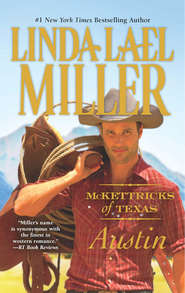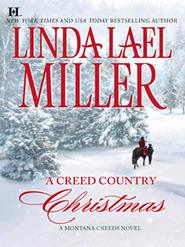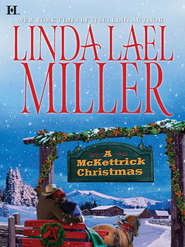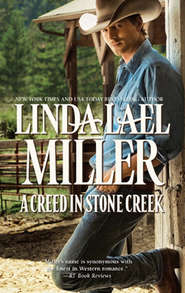По всем вопросам обращайтесь на: info@litportal.ru
(©) 2003-2024.
✖
Once A Rancher
Настройки чтения
Размер шрифта
Высота строк
Поля
Here’s a concept. Why don’t we discuss this in person?
Blythe immediately replied with an icon of her own, a smiley face sticking out its tongue.
Slater groaned and dropped his smart—or smart-ass—phone into his shirt pocket.
This was going to be a good day, and an even better evening, spent with the women he loved—young, old and in-between.
Raine was still on his mind as he headed for the front of the house. The last time he’d seen her, her shining dark hair bounced around her shoulders, but considering how impulsive she was, she might’ve had it cut short or dyed it green in the interim. She had mischievous hazel eyes and an infectious laugh; it had been that laugh that had caught his attention in the first place, when they’d met at a party a little over a decade ago, the beginning of a six-month affair. A talented graphic artist, Raine also designed websites and had recently done a stunning one for the winery.
His thoughts shifted, once again, to Daisy. From the very beginning, she’d been a member of the Carson clan; they’d instantly embraced her. In fact, they completely spoiled her. There’d been the pony from Uncle Drake, the custom dollhouse from Uncle Mace, the fit-for-a-princess bedroom their mother had designed for the little girl’s frequent visits to the ranch. Slater had finally had to ask them, politely of course, to stop one-upping him all the time.
Yeah, that had worked. The Christmas he’d given Daisy a bicycle, she’d received two more—one from each of her uncles.
But these were small glitches to Slater. Early on, he’d been afraid Raine might decide to leave town, move somewhere far from Mustang Creek to pursue big-city work opportunities, taking Daisy with her. But that fear had been put to rest when he and Raine had signed a joint custody agreement.
He’d bought her a house in town, and she’d established herself as a valued member of the community.
Raine had also been the one to suggest that Daisy take the Carson name.
Slater stepped onto the side porch, really more of a veranda, and saw that his mother was waiting, chatting with one of the hands, who held the reins to two saddled horses. The older man’s eyes lit up in his weathered face, and when Slater got close enough, he received a hearty slap on the back as welcome. If he hadn’t been expecting it, he might have staggered under the blow.
“Slate, good to see you, son.” Red—named after the river—was a true tough-as-nails cowboy, the old-fashioned variety. He was like a human barometer, and Slater didn’t check the forecasts when he was home; he just asked Red, who would squint at the sky and give him an accurate prediction every time. Slater could swear the man had worn the same hat for the past thirty years, but maybe he just liked the style and actually bought a new one now and then.
“Good to be home,” he said, meaning it. “When I come back, I always wonder why I left to begin with.”
“I wonder the same dang thing.” Red patted the neck of one of the horses, a restive bay. “This here is Heckfire,” he told Slater. “I know you miss old Walter, but Drake and I thought you might like this young fella.”
The horse was a sleek beauty with a glossy coat, and he tossed his head against the rein. Slater sensed that it wasn’t so much rebellion as the fact that he wanted to get moving. All this yammering is boring. Let’s run.
There was no question that Slater missed his gelding, a horse that had been a gift from his father. But his four-legged friend had been nearly thirty years old, and when Slater had said goodbye on his last visit, he’d known it was for the final time.
He ran his hand down the length of the horse’s muscled neck and was rewarded with a nicker and an investigative sniff as Red handed over the reins. “He’s a showstopper. But... Heckfire?”
“We call him Heck. The name comes from Drake. Even as a colt, this critter was causing trouble, and we hadn’t named him yet and your brother said, ‘Heck, he’s full of fire.’” Red paused, cleared his throat then glanced at Blythe and blushed. “Well, he didn’t exactly say ‘heck,’” he clarified. “Anyhow, we, uh, adapted the name, and it stuck.”
Blythe rolled her eyes but said nothing. Red was an institution on the ranch; he’d worked for the family longer than Slater had been alive. A widower, the old man had never gotten over his long-dead wife. He still placed flowers on her grave every Sunday afternoon.
Slater merely waited, nodding once, because it was obvious Red had more to say. “You’ll have to teach this stubborn cayuse a few manners,” the old cowboy said, rubbing his grizzled chin and assessing the gelding solemnly.
“You know I like a challenge,” Slater said. “Once he and I come to an understanding, things will be fine.” With a sidelong glance at his mother, he threw in another observation. “Just like women.”
Sure enough, Blythe elbowed him in the ribs. Hard.
Since he’d been prepared for her reaction, Slater barely flinched.
Red chuckled. “Now, there I’ll have to disagree with you, son. No man ever understood a woman. They’re a whole other species.”
Blythe cleared her throat and folded her arms. “Excuse me? I—a woman, as it happens—am standing here listening, or have you two bone-headed males forgotten that?”
“Mrs. Carson, ma’am.” Red touched the brim of his hat, still grinning irreverently, and politely held her horse while she mounted. Slater swung into his old familiar saddle, felt another pang at the loss of Walter, but was pleasantly surprised by the fluid smoothness of the bay’s gait as they cantered down the drive. The old cowhand was right; the horse ignored subtle commands like an irritable teenager, but basically behaved himself. Slater had been around horses since early childhood, and he knew a fine animal when he rode one. He applauded Drake on this particular choice.
They slowed once they reached the first row of vines, which to his admittedly inexpert eye seemed to be doing well. “Mace put in an irrigation system that cost a staggering amount of money,” his mother told him as they walked alongside their horses. “But you know, when it comes to anything with leaves and branches, I trust him. He’s made several trips to the Willamette Valley, visited your uncle in California for hands-on harvest demonstrations several years in a row, and he’s really getting a feel for it. He’s grafted some varieties with surprising success, and if he can produce just the right grape, we might be in a position to stop ordering most of our fruit, like we do now, and produce enough ourselves. Certainly the apple wine he made last year was a big seller on a commercial level, but he’s tried a bit of everything, including cranberry and peach. Plus different varieties of red, from merlot to zinfandel, and whites from chardonnay to Riesling. You name it. He loves experimenting.”
“I’m sure he’s having fun. He’s like a mad scientist,” Slater said. “I still remember when he was in college and he started making his own beer. His apartment looked—and smelled—as if he’d hijacked a still from the hills of Kentucky or something. I went there to visit him once, and he persuaded me, against my better judgment, to take a swig. The stuff tasted okay, but I don’t remember one damn thing about the rest of the night. As I recall, I slept upright in a chair, still fully clothed, and come morning, I had a crick in my neck you wouldn’t believe. I declined to repeat the experience. He thought it was funny.”
Blythe sent him a mischievous grin. “I’ve heard that story a time or two. I hate to be the one to break the news, but he still repeats it.”
“If he values his health, he’d better not do it in front of me.” Slater meant it. Adding insult to injury, he’d awakened with a vicious headache that memorable morning. Worse, he’d felt like seven kinds of fool.
“Ah, there’s nothing like having three boys.” Blythe’s tone was wry.
“Except having a little girl who’s getting to be not so little. Daisy’s ninth birthday is coming up. Any ideas?”
“Yep, but it’s every man for himself, Slater. Both of her uncles have asked me the same question. I didn’t help them, either.”
“I’m her father. That’s different.”
His mother gave him a pointed glance he recognized. Drake and Mace were equally familiar with the expression, no doubt. “Don’t you think it’s time you got married and had a few more children?” she asked. “For Daisy’s sake, of course.”
CHAPTER FOUR (#ulink_a2c556bf-6594-5d85-9c89-ddf70f162fe7)
NO PRESSURE.
At all.
Grace sipped her morning coffee, checked the time on the computer in her home office and felt as if she hadn’t seen the light of day except through a window all week. She needed to go for a long walk to clear her head.
Ryder was in trouble at school. It wasn’t a big deal, just some roughhousing during gym, but he’d been sidelined and suspended from PE class for a full week. The worst part was that he hadn’t told her about it. The coach had called.
This situation was troubling, to say the least, and she felt totally inadequate. Walking the fine line between being likable and being any kind of disciplinarian was proving to be a real challenge, but here she was, doggedly doing her best.
Maybe—maybe—Ryder was doing his best, too. It was one thing to be a single parent; it was another to be the single parent of a child who wasn’t your own. She loved Ryder. That wasn’t in question and never would be. But the boy clearly had issues, and little wonder, since he’d been neglected by both his parents for most of his young life. How had that problem, one she hadn’t created, wound up being hers to solve?
More frustrating still, Grace realized Ryder’s mother was never going to do anything to help, and Hank was off who knew where—no one was allowed to know—and it had become her dilemma. The worst part was that Ryder was a bright kid, so he was perfectly well aware that none of this was supposed to be up to her, a stepmother with no legal authority over him whatsoever. Naturally, he was resentful as hell. The poor kid needed somebody to be mad at, some way to vent all that adolescent emotion.
The whole mess just about broke Grace’s heart.
There was a scratching sound at the back door of the condo, and Grace left her office, crossed the small kitchen and looked out through the screen. The cat, perched primly on the welcome mat, peered in at her and meowed. Bonaparte, so recently rescued, was filling out nicely, now that he was getting regular meals and plenty of love.
He was completely black except for a white patch on his chest, had startling emerald eyes and had yet to allow Grace to pet him, although she’d seen Ryder sit down and coax the cat onto his lap numerous times. The roughness of Bonaparte’s fur was already smoothing out and he was friendlier, but she did wonder how they’d ever get him into a pet carrier so they could take him to the veterinary clinic for a checkup, neutering and shots.
Disregarding her own rules, she opened the screen door, fully expecting the little creature to run away. But when she stood back to allow him space, he timidly came inside, taking one careful step at a time as if he were asking do I really live here?
The sight gave Grace another twinge of pain, because it reminded her so much of Ryder. Wary, uncertain of his place in the world, grateful, even eager, for acceptance, but hesitant, too. Never quite knowing where he belonged, or with whom.
“I’ll leave you alone until you’re ready,” she told the cat in a gentle voice. “Ryder will be home soon.”
Then I have to yell at him, Grace thought miserably. Which I don’t want to do, but I have to file it in the folder labeled For Your Own Good.











